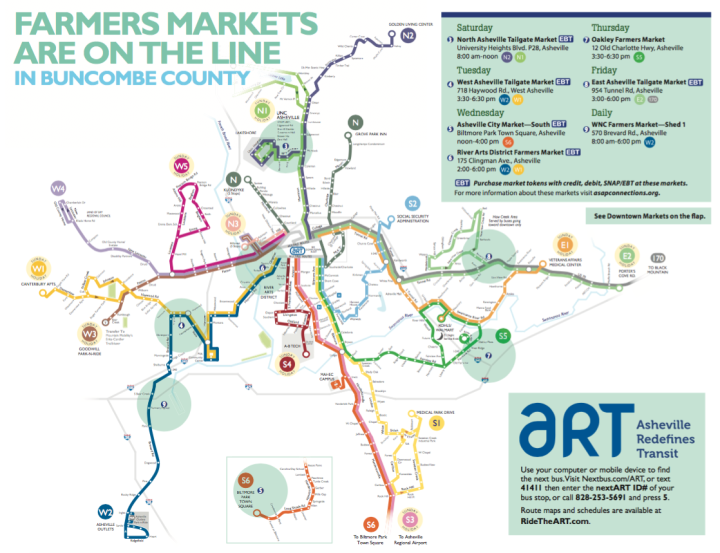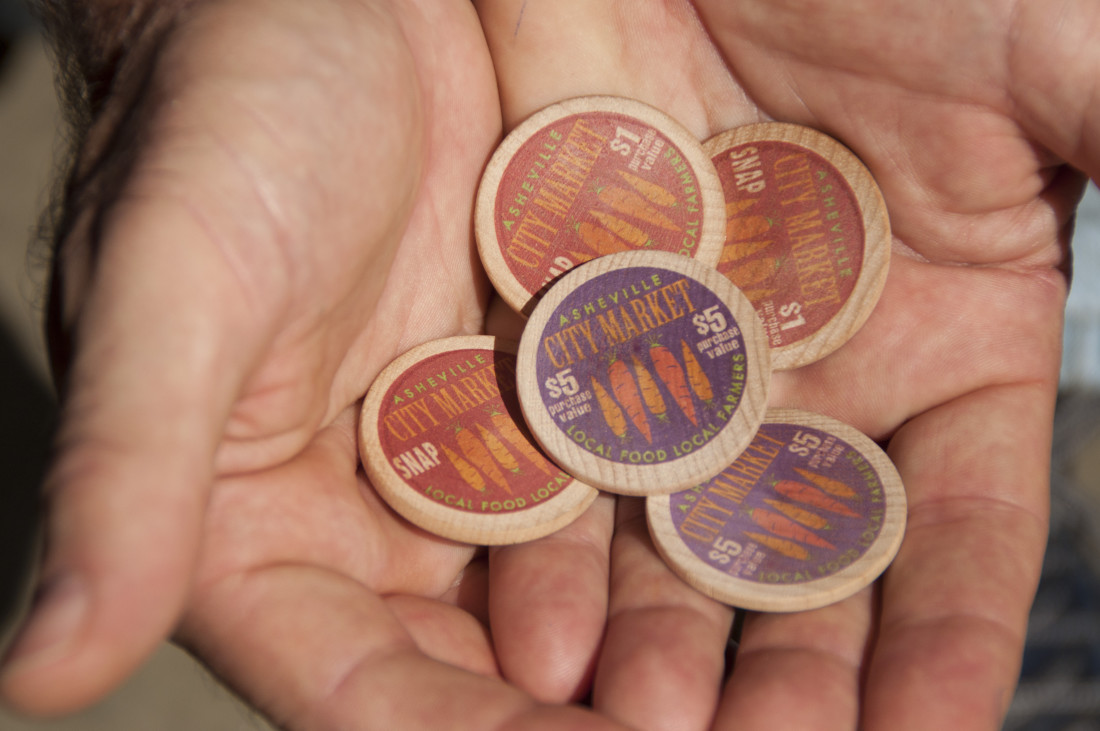Asheville is a tailgate market town. Nearly every day of the week during growing season, one can find white tents popping up in parking lots, fields and even in the middle of downtown streets, with local farmers hawking their produce, meat, eggs, honey and other products.
When the weather turns cold, markets in some areas head indoors to keep things hopping until spring. And in other locales, cooperatives and small grocery markets take over as dependable outlets for sourcing locally grown food products.
Both farmers markets and grocers serve as vital links between local growers and residents. But accessing these options can prove challenging for those who lack reliable transportation or the financial resources to support their friendly neighborhood farmer.
Get on the bus
A 2015 survey by the U.S. Department of Agriculture Economic Research Service found North Carolina to be the eighth-most food-insecure state in the nation. And in 2016 in Western North Carolina, over 20,300 residents — more than a third of whom are children — received Supplemental Nutrition Assistance Program benefits (formerly known as food stamps) to help put food on the table.
The federal program that became SNAP was first introduced in 1933 during the Great Depression through the bipartisan Farm Bill, which was designed to permanently link agricultural subsidies with hunger assistance programs. The idea was to use existing food distribution systems and markets to help feed families in need, while the expenditure of those dollars would provide stimulus to the nation’s farmers. Families would be freed to spend what little money they had to cover needs other than groceries, which would boost the overall economy. Although just 2 percent of the national budget is allocated to SNAP, Moody’s Analytics calculates that the program generates $2 in economic activity for every federal dollar spent.
In the same spirit of supporting both growers and low-wealth consumers, some WNC nonprofits are looking to help improve access to fresh, locally produced foods for SNAP recipients while also broadening the base of support for local agriculture. “One of the key barriers for SNAP recipients shopping at farmers markets — and it is cited time and time again — is [the need for] low-cost transportation,” says David Smiley, a program coordinator for the Appalachian Sustainable Agriculture Project’s Local Food campaign.
With help from a three-year grant from the U.S. Department of Agriculture, Smiley collaborated with Asheville Redefines Transit to develop a map linking bus riders with local tailgate markets. “Public transportation can be one of the most obvious ways to get people places,” he explains. “When we compared bus routes with local markets, there was nearly an identical match with where farmers markets are and the ART bus routes. There is a bus stop literally steps away from every farmers market in town.”
ASAP also has other initiatives in place to help connect SNAP recipients with area farmers. “Our goals are to better promote farmers markets that accept SNAP, to engage communities that aren’t currently supporting farmers markets or local food and help markets that don’t participate in SNAP yet become more SNAP-friendly,” he says.
Of the nine markets in town, all but two — the WNC Farmers Market and the Oakley Farmers Market — are set up to take SNAP payments. “SNAP sales don’t make up a huge portion of market sales,” he points out. “It is a common misconception that people who use SNAP only use SNAP. Most people that use SNAP at markets are also using credit cards, they are also using cash, and it definitely makes a difference with vendors’ sales, being able to accept SNAP, and most farmers are doing better because of it.”
Doubling up
For those who can’t make it to the markets for one reason or another, Bountiful Cities has a solution. At the request of the Asheville-Buncombe Food Policy Council, the local nonprofit helped launch the Double Up Food Bucks pilot program at two local markets last year. Double Up Food Bucks, which was originally conceived to combat food insecurity in Detroit, increases consumer buying power by matching each SNAP credit spent on local produce dollar for dollar.
Still in its testing phase, the local program has thus far proved successful. Since September, nearly 300 customers have used Double Up Food Bucks at the two Asheville test sites — the French Broad Food Co-op and the West Village Market.
“Many thousands of dollars worth of produce have been purchased at those two locations, and of course, all the customers are using SNAP for those purchases,” says Nicole Hinebaugh, Bountiful Cities program director and the access cluster representative for the ABFPC. “These are all people who, by definition, might be considered food-insecure, so this is literally thousands of dollars worth of food that is going, by choice, into the hands of people who are food-insecure.”
Both ASAP’s collaboration with ART and Bountiful Cities’ Double Up Food Bucks program will reach the end of their grant funding soon. But ASAP intends to continue the map initiative by shifting it to function through other existing programs. And Bountiful Cities has plans to hand Double Up Food Bucks over to MountainWise, a nonprofit that works with regional health departments to promote healthy eating and lifestyles.
Hinebaugh hopes that ultimately being connected with the larger nonprofit will help open some doors for the Double Up program. From the outset, one of Double Up’s biggest hurdles for growth was finding funding to implement the system in larger grocery stores. For the program to work, every federal SNAP dollar spent has to be matched with grant money, and that can add up to a lot of cash on the barrelhead when applied to large grocers like Ingles or Bi-Lo.
“It’s a matter of building up capacity so that we can go after one of those really big fish,” says Hinebaugh. “Because MountainWise partners with health departments in all of the counties in the western region, they actually have access to a different realm of funding than we, as a grassroots organization, have access to.”
While it might be easy to reduce both of these programs to a matter of metrics, to only evaluate their success by how many people they have directly served, Hinebaugh notes that the more important work comes in changing the prevailing culture. “It’s a matter of systems change versus symptoms change,” she says, noting the classic analogy of saving babies in a river.
“You discover that there are babies floating down the river, and you start pulling [them out], and you organize efforts to get the babies out of the river and you document your efforts, and that is a really obvious way to help those babies,” she explains. “But the other way to help those babies is to figure out why they are winding up in the river in the first place. Do people need meals to be distributed? Yes, absolutely. But the reason that they need meals to be distributed is because we have food insecurity.”
The trick, muses Hinebaugh, is to address the fact that people need to be fed by having emergency resources like food pantries while also tackling the underlying reasons behind the community’s food-insecurity issues. And part of the way to do that is to make sure there is adequate support for local agriculture.
The ASAP/ART farmers market bus map is available at asapconnections.org, click on “Find Local Food.” Or find it at the downtown ART bus terminal. To get multiple copies for distribution, call ASAP at 828-236-1282. For more on the Double Up Food Bucks program, visit doubleupfoodbucks.org.




Before you comment
The comments section is here to provide a platform for civil dialogue on the issues we face together as a local community. Xpress is committed to offering this platform for all voices, but when the tone of the discussion gets nasty or strays off topic, we believe many people choose not to participate. Xpress editors are determined to moderate comments to ensure a constructive interchange is maintained. All comments judged not to be in keeping with the spirit of civil discourse will be removed and repeat violators will be banned. See here for our terms of service. Thank you for being part of this effort to promote respectful discussion.